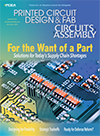News
PLAINVIEW, NY, Dec. 27 -- Aeroflex Inc. said today it received $13.6 million in radio test set orders from the Army, Army National Guard and the Air Force.
Beginning in May, the company will start shipping the sets over a 14-month period.
The order brings the company's military communications orders to $22 million for fiscal 2005. The company booked about $414.1 million in sales in 2004.
Areoflex makes testing and microelectronic products for the aerospace, defense and communications markets.Chrys Shea of Cookson Electronics won for Best of Conference, Alan Donaldson, Intel Corp., won Best of Proceedings, and Lars Boettcher, Fraunhofer IZM Berlin, won Best International Paper.
The awards are chosed by attendees and recipients win $1,000.
Shea was awarded Best of Conference Paper for "Optimizing Stencil Design for Lead-free SMT Processing." The paper identifies optimized stencil aperture geometries and explores the lower spread of lead-free alloys on some alternate surface finishes.
Donaldson's paper, "Hot Air Lead-free Rework of BGA Packages and Sockets," presents rework profiles and a process developed based on actual package reliability tests.
Boettcher's paper, "Development of 3D-Redistribution and Balling Technologies for Fabrication of Vertical Power Devices," which reveeals the development of a 3-D wafer-level redistribution process based on fully additive metal deposition.
The SMTA is seeking papers for its 2005 conference in September. Abstracts will be accepted through Feb. 7 at www.smta.org/smtai/call_for_papers.cfm.
METHUEN, MA, Dec. 28 -- Infineon Technologies and Parlex Corp. have struck a deal to jointly manufacture and sell substrates for secure mobile electronic identification products. The companies will set up a JV to supply substrates for Infineon's Flip Chip on Substrate program, and to outside customers.
The joint venture will be headquartered in Hong Kong with manufacturing facilities in China. Operations are expected to begin in April.
Under the terms of the agreement, Parlex will have a 51% equity share with Infineon holding the remaining share. Infineon will also pay Parlex $3 million.
Parlex's Shanghai flex circuit plant will also provide certain services which will be paid for by the JV, the companies said.
The electronics manufacturer lowered its fourth-quarter earnings to $5.4 million from $11.5 million. In fiscal 2003, Sanmina-SCI posted a quarterly loss of $85.7 million.
The company also revised its 2004 loss to $11.4 million, about double its earlier reported loss of $5.3 million. Sanmina-SCI reported a loss of $137.2 million in the previous year.
The adjustments were recorded in Sanmina-SCI's fourth quarter and included stock-based compensation charges of $2.4 million, an increase in interest expense of $2 million from certain acquisitions and restructuring charges of $1.1 million.
Sanmina-SCI said adjusted earnings, which exclude unusual items, were not affected by the accounting charge. In October, the company posted adjusted earnings of $41.8 million, and $128.9 million for fiscal 2004
AUSTIN, TX, Dec. 30 -- A dramatic escalation is ahead in device-to-device communication as traffic on the Internet is no longer people talking to people, but people talking to devices and devices talking to devices.
So says self-styled futurist and technologist David Smith, a vice president at Technology Futures Inc., and who has worked with Boeing, Hughes, Intel, Compaq and the CIA.
Other forecasts, as issued by the firm today:
- The timeframe of the product life-cycle continues to decrease: By the time a product hits the market, its shelf life is half what it used to be. So the science and research time will become more intensive and innovative earlier as product development time continues to compress.
- Outsourcing and globalization become paradigms of success: Businesses must understand and adapt to the new source of competitive advantage by connecting to the core competencies and customer interaction on global scale. In the global business world, global interaction is imperative.
- Broadband and high-speed wireless penetration reach a large enough market for new classes of applications to emerge: These new products will explicitly take advantage of what broadband and wireless networks have to offer in terms of mobility and accessibility to markets.
- The Age of Bio will maintain its marked acceleration: National and global collaboration is enhancing its commercialization potential.
- An information age emerging increasingly driven by needs for precision, accuracy and timeliness in all endeavors -- personal, business, governmental.
- A major revolution continues in IT growth in such areas as the Internet, wireless and wired communications, mobile applications and electronic commerce.
- Information technology becoming ubiquitous and expanding within the private, business and global worlds. Every device becomes a server.
- Quality of life improvements in such areas as smart appliances, cars, highways and buildings, easier access to knowledge, and revolutionary new concepts in health-related fields.
- An increasingly mobile and global society becoming ever more reliant on a worldwide availability of information.
The firm says that in order for these trends to come about, certain policies must be put in place, including an open, standards-based infrastructure that position U.S. organizations as early adapters to information technology developments.
The merger is expected to close by March. Vishay will also settle SI's outstanding bank debt of $10.5 million at closing.
For the fiscal year ended July 31, SI reported net sales of $36.2 million.
In a press release Vishay said, "This transaction will further reinforce our position in the transducer, instrumentation and systems markets and will complement and enhance our existing capabilities in these areas."
Vishay is one of the world's largest manufacturers of discrete semiconductors and passives. SI designs and manufactures industrial sensors and controls, and weighing and factory automation systems and related products.
Press Releases
- Industry Leaders Koh Young, Fuji America, and Creative Electron Unite to Launch The SMT Future Experience
- NanoFlowX Announces Strategic Partnership with Bentec Ltd to Accelerate PCB Protection Innovation Across Europe and India
- Strong signal for the industry: productronica 2025 drives positive industry trend
- Sharpen Your ESD Skills: CE3S Announces Desco’s First ANSI/ESD S20.20 Training Series for 2026


